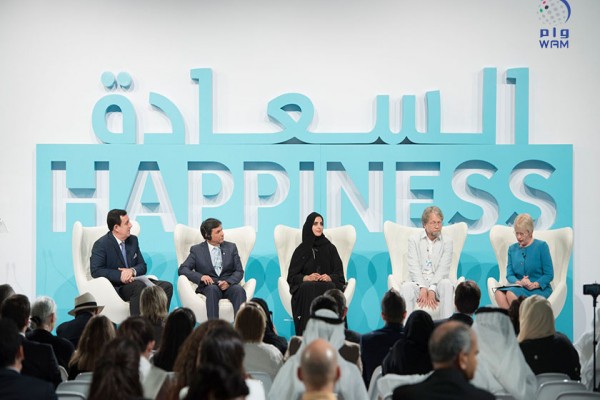
Experts highlight role of cities in delivering happiness
(WAM)--Governments across the world are faced with the challenge of delivering happiness. While this task is more complex at a national level, local governments can often cater to citizens’ needs more effectively, a rapt audience at the Global Dialogue for Happiness heard on Saturday.
The remarks were made by John Defterios, Emerging Markets Editor at CNNMoney, who moderated a panel session themed ‘What is the Role of Cities in Creating Happiness?’ At the event that served as a prelude to the fifth World Government Summit (WGS 2017).
Speaking on how local governments can deliver happiness, Mary Hanafin, Country Councillor of Dun Laoghaire-Rathdown from Dublin, Ireland, stated that governments need to focus on housing and safety before delivering on other areas of development.
She said, "If you’re going to give people happiness as citizens, they have to have a sense of belonging – for that you must have a home and live in a safe community."
Dr. Aisha Bin Bishr, Director-General of the Smart Dubai Office, highlighted the importance of understanding what different communities need in a multicultural society like Dubai. "We want all those millions who call Dubai their home to continue to call it their home. Therefore, it is important to us that we sustain their happiness and their well-being."
Referring to the importance of data to understand the needs of citizens, she added, "Data is at the core of smart cities. We develop a lot of tools to make sure that we utilise our data - to implement and provide smart policies to improve happiness."
According to Luis Mella Gajardo, Mayor of Quillota, Republic of Chile, collaboration, rather than competition, is the key to happiness.
He said, "Quilloto is going through a cultural transformation and we want to move from competing to collaborating. Our aim through this strategy is to ensure the happiness of our individual citizens. We are trying to tell people it is possible to have a different perspective on development."
Professor Antanas Mockus, former Mayor of Bogota, Republic of Colombia, emphasised the need to balance economic goals with happiness.
He said, "Money is always a coordinator of human behaviour, but it’s a non-permanent one. Economic improvement does not always guarantee happiness."
Describing his radical policy to encourage road safety, an important parameter of happiness and well-being that replaced traffic police with mimes who stood on street corners and ridiculed drivers that violated traffic rules, he said, "At the end of the first year, we had 70% of the population using seatbelts and being more focussed on their driving."
The World Government Summit has attracted more than 4,000 personalities from over 139 countries. The attendees include VIPs and senior experts from the public and private sectors globally, ministers, decision makers, CEOs, innovators, officials, experts, entrepreneurs, academics, and university students.
Several initiatives, reports and studies are set to be launched during the summit and throughout the year. The summit runs from February 12 to 14, 2017 at the Madinat Jumeirah in Dubai.
WAM/Majok



























